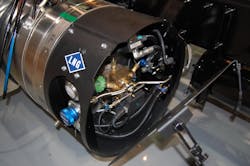Pondering new measurement rules for CNG, LNG
This July, the National Conference on Weights and Measures (NCWM) plans to vote on a new recommendation that compressed natural gas (CNG) and liquefied natural gas (LNG) be sold in terms of gasoline and diesel gallon equivalents as opposed to units of mass, such as pounds or kilograms.
The group noted that most U.S. consumers are accustomed to buying motor fuel in gallons, yet natural gas isn’t metered the way gasoline and diesel are. Thus when a vehicle is refueled with CNG or LNG, it’s dispensed by weight, not volume.
NCWM said proponents of the gallon-equivalent units of sale change explained that this new approach would “recognize marketplace conditions” including existing dispenser capabilities, consumer awareness and interest comparing alternative fuels with conventional fuels.
Yet the group added that concerns remain that the terminology of gallon equivalents would be establishing a new mass standard – and would by extension also imply the ability to make comparisons of cost or quality between gasoline or diesel and natural gas, something several NCWM members claim is not really possible.
NCWM pointed out that gallon equivalents are derived by determining the mass and dividing it by a constant to determine a gasoline or diesel gallon equivalent. For example, under the group’s steering committee’s recommendation, a diesel gallon equivalent (DGE) would mean 6.38 pounds of CNG or 6.06 pounds of LNG.
The group added that attendees of the 99th NCWM annual meeting in Detroit will have the opportunity to comment on the proposed measurement change on July 14 and 15 in open hearings before putting them to a vote on July 16 and 17.
About the Author
Fleet Owner Staff
Our Editorial Team
Kevin Jones, Editorial Director, Commercial Vehicle Group
Cristina Commendatore, Executive Editor
Scott Achelpohl, Managing Editor
Josh Fisher, Senior Editor
Catharine Conway, Digital Editor
Eric Van Egeren, Art Director
